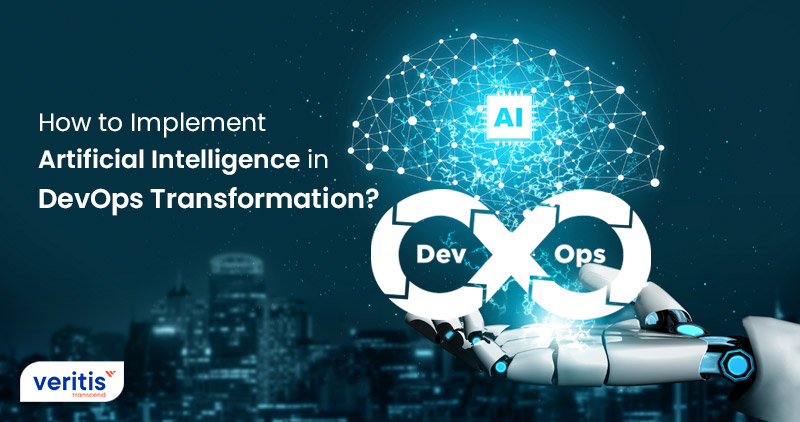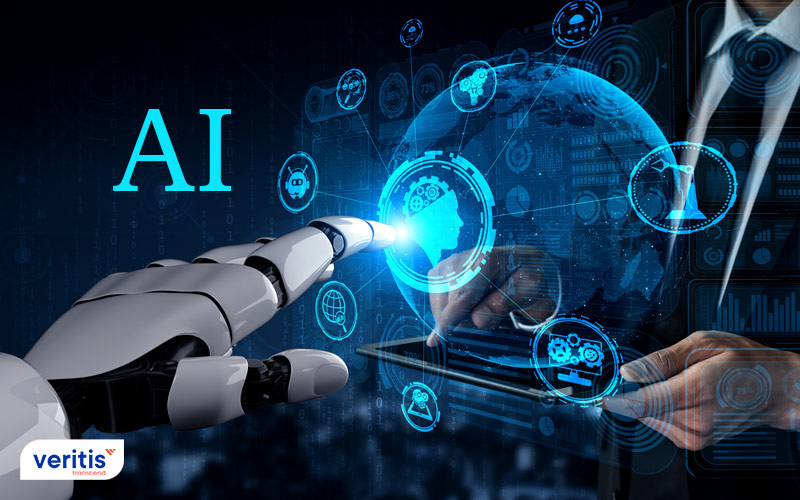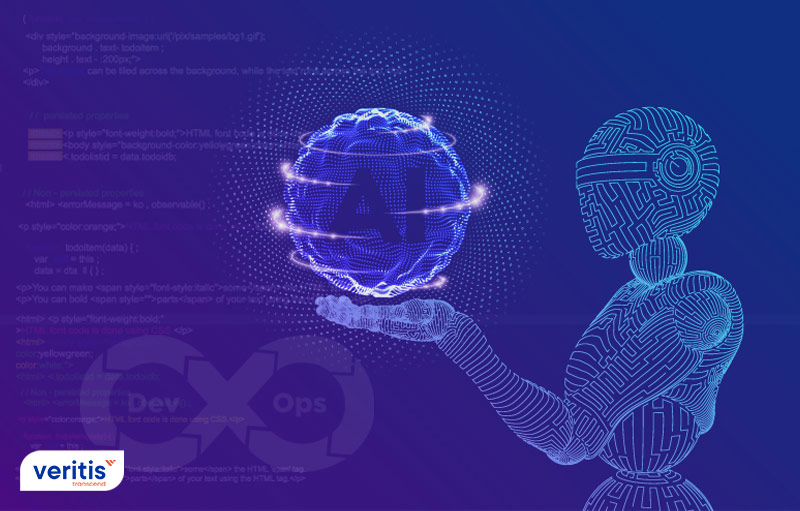
Table of contents
- What is Artificial Intelligence (AI)?
- What is DevOps?
- How do DevOps and AI Work Together?
- What Beneficial Effects is AI in DevOps Transformation?
- Enhance Automation
- Enhance Data Correlation Across Platforms
- Issues are Resolved More Quickly
- Enhanced Security Through Anomaly Detection
- Improve Teamwork Between Teams
- Software Testing
- Enhance Data Access
- Timely Alerts
- Superior Efficiency in Execution
- More Intelligent Resource Management
- Accelerated Root Cause Analysis
- Feedback Loop
- Managing Project Requirements
- Capping it Off
Globally, businesses are under tremendous pressure to innovate digitally to stay competitive. As a result, software development and operations, or DevOps, is one of the main areas that many firms have identified as a source of opportunity to accelerate their pace of innovation. However, although DevOps technology has advanced significantly in recent years, it is still tricky.
For instance, expert evaluation is necessary for problems involving concurrency, security, or the management of sensitive data. These problems frequently occur through peer code reviews and unit testing. With artificial intelligence (AI) for DevOps, more automation and proactive techniques are used in DevOps transformation, enabling teams to develop more swiftly.
AI enables teams to develop, code, and check software more quickly and effectively. The future of DevOps is changing fundamentally because of AI. DevOps practices will become more AI-driven in the future. Moreover, in its traditional application in the DevOps environment, AI can help tackle security concerns and data leakage.
“As per the Gartner survey, 40% of DevOps teams will be using IT operations systems with integrated artificial intelligence for application and infrastructure monitoring by 2023.”
Let’s first comprehend how AI in DevOps is connected before exploring how AI will change the way that DevOps is done.
What is Artificial Intelligence (AI)?

AI is making robots intelligent and programming them to think like humans. It enabled the imitation of simple to complicated human actions. It advances technology to new heights. AI can appear in multiple ways. Several instances are:
- The term Artificial intelligence (AI) refers to describing how machines simulate or approximate human intelligence. Artificial intelligence aims to improve learning, reasoning, and perception through computers.
- AI is currently used in multiple sectors, from banking to healthcare.
- Strong AI handles more sophisticated and human-like tasks, whereas weak AI typically focuses on simple, single tasks.
- Chatbots employ AI to comprehend consumer issues and offer more effective solutions quickly.
- With the help of AI, intelligent assistants can better schedule tasks by extracting important facts from enormous free-text databases.
- Based on consumers’ viewing patterns, recommendation engines can offer automated recommendations for TV shows.
- Many critics worry that the widespread application of cutting-edge AI might have a negative impact on society.
About AI
Since it was coined in 1956, the term “artificial intelligence” (AI) has gained popularity due to growing data volumes, sophisticated algorithms, and advancements in computers and storage. AI automates repetitive data-driven learning and discovery. Digital AI carries out regular, high-volume, automated tasks rather than manual ones. And it does the work continuously and without getting tired. But, mankind must still set up the system and pose the proper queries to make the infrastructure work efficiently.
Existing items become more intelligent using AI. AI capabilities will add to many of the items you already use. In many ways, Siri was brought as a feature to a new generation of Apple products. Large volumes of data can use with automation, conversational platforms, bots, and smart machines to advance numerous technologies. Security intelligence, smart cameras, and investment analysis are just a few improvements being made at home and work.
Digital AI is significantly less about any specific format or purpose and more about the method. It is about the capacity for superhuman thought and the processing of data. Despite the stereotype that high-functioning, human-like robots will eventually rule the world, AI isn’t meant to replace people. On the contrary, it aims to significantly improve human skills and contributions. As a result, it has a high business value.
AI uses neural networks with numerous hidden layers to evaluate larger and deeper amounts of data. Earlier, creating a fraud detection system with five concealed layers was impossible. However, big data and powerful computers have transformed everything. Deep learning models need a massive amount of data because they derive their knowledge directly from the data.
Useful link: All You Need to Know about Artificial Intelligence as a Service (AIaaS)
What is DevOps?
DevOps is a collection of techniques. It incorporates information technology and the software development process. Software development, testing, and release are all accelerated by DevOps. DevOps’ primary responsibility is to evaluate the process at each stage continuously.
Development and operations are merged through a DevOps environment. Massive data is produced by DevOps. This information is used for monitoring, simplifying the work process, and other tasks. As a result, massive amounts of data are produced during some essential processes, yet employees cannot handle them.
DevOps implementation involves more than simply using tools; it also involves how people work and the procedures they follow. With the advent of DevOps trends, there is no longer a traditional division of silo between the engineering teams that develop applications or services and the operations teams that manage their day-to-day operation. Instead, the complete lifecycle of services and products and everything required for their supply and operation is aligned with processes and activities.
The main goal of a DevOps-based delivery pipeline is all about training operations and development teams to:
- Enhance collaboration
- Acting and thinking similarly
- Silos and barriers should be eliminated
- Shared tasks
- Focus on the integrated, continuous delivery process known as a value stream, which includes quality assurance, version control, configuration management, and releases management
AI is employed in that situation to compute and make decisions. It improves accuracy and speeds up production. Automation of all kinds of business processes is made possible by AI. So, contribute to time savings and increased productivity. Therefore, artificial intelligence is essential to the future of DevOps.
How do DevOps and AI Work Together?
AI is a technology that may combine into the system to increase performance, and DevOps is a business-driven approach to delivering software; they are interdependent. For Instance, DevOps teams may test, code, release, and monitor software more efficiently with AI. In addition, AI in DevOps may improve automation, identify issues quickly, and improve teamwork.
AI can significantly boost DevOps productivity. It can enhance performance by enabling rapid development and operation cycles and providing an engaging user interface for these functionalities. In addition, principles of DevOps system components can be facilitated by machine learning tools.
These standard development metrics are discovered, such as burn rate, defects found, and velocity. In addition, data generated by continuous integration and tool deployment are included in the DevOps environment. Metrics evaluated and linked together, such as the number of integrations, their success rate, the time between them, and the number of mistakes per integration, can have any real value.
Applying DevOps technologies, AI allows for the operationalization of machine learning models from design to production, which enables AI at scale. In addition, AI in DevOps ensures that the appropriate delivery methods for AI are in place and can provide adaptability. And the “fail fast” attitude is required in these periods of rapid technological change. DevOps AI will essentially enable continuous delivery, deployment, and monitoring of models by:
Speed: Reduce non-value-added activities in AI delivery to shorten the time to market.
Quality: To enhance the quality of AI models, accelerate dataset cleanup and promote ongoing learning.
Scalability: Anticipate scaling issues and make sure AI models can scale as needed.
Stability: Maintain deployed digital AI models’ dependability, stability, and accuracy.
Why Veritis is Best Digital Transformation
What Beneficial Effects is AI in DevOps Transformation?

These are some notable instances of how AI is positively affecting DevOps:
1) Enhance Automation
Automation is the most obvious area where the inherent value propositions of DevOps and AI collide. AI may significantly benefit the DevOps transformation process by lowering the requirement for human engagement throughout processes and increasing the automation quotient. Consider quality assurance and testing as an example. Unit testing, regression testing, functional testing, and user acceptability testing can all be completed more quickly with the help of testing platforms.
These operations frequently provide a large amount of data, which can increase the accuracy of these tests and reveal insights into errors and consistently wrong coding methods. The latter is quite beneficial for helping coders discover their areas for improvement and raise their performance.
2) Enhance Data Correlation Across Platforms
Teams utilize an array of development and deployment environments inside a larger technology ecosystem. Each team and its environment encounter its own unique set of problems and faults, which are recorded by monitoring tools. Unfortunately, there is typically little reciprocal learning among these teams without a robust communication framework.
We can improve the correlation of data from many platforms, speeding up the learning cycle by combining all the issue data into a single data lake and using DevOps AI. Let’s use monitoring tools as an example. Here, machine learning DevOps or ML DevOps can be employed fiercely to absorb and unearth insights from data streams of numerous monitoring tools. As a result, IT teams will get a complete and more accurate picture of the state of their applications.
3) Issues are Resolved More Quickly
Enterprise performance is generally negatively impacted by software flaws and difficulties. They can be disastrous when the digital platform is a customer-facing asset. In the past, businesses could afford to leave problems in their event management systems for days or even hours. This is no longer the case. We need to identify and fix performance issues in our technology-driven era quickly. Again, using AI and DevOps technologies together can shift the game.
AI can assist in identifying the most critical issues affecting the application, gather all pertinent diagnostic data relating to the problem, and even suggest a prescriptive remedy. Additionally, by observing the results of the action made after the problem was found using training data sets. Prescriptive AI systems have the potential to make recommendations that are even more accurate and hasten the resolution of problems.
4) Enhanced Security Through Anomaly Detection
DevSecOps, which incorporates information and data security as a key component of software development across the lifecycle, is significant and current use of DevOps automation. Businesses are more susceptible to DDoS (Distributed Denial of Service) assaults, and the possibility of hackers intercepting a secure system loom over everything. AI can use to enhance DevSecOps to provide the best performance. For instance, they established a centralized logging architecture to log threats and ominous behavior.
Developers may properly identify possible risks to their system and protect it for the future by using ML-based anomaly detection techniques. This proactive method can reduce the effects of DDoS and hacker attacks using DevOps trends and AI.
5) Improve Teamwork Between Teams
This final aspect relates to the ongoing cultural gaps between the development and operations teams. The main area of cultural conflict between the two teams is the tendency of developers to deliver code quickly and frequently. And the tendency of operations teams to make sure that existing systems are not disrupted excessively.
A DevOps automation culture reduces the time it takes to deploy releases for both groups while bringing dual accountability. While initially, it may be challenging to maintain this delicate balance, AI may significantly enhance collaboration amongst DevOps teams. In addition, teams can benefit from using AI-powered systems to have a unified understanding of system issues across the extensive DevOps toolchain. And simultaneously enhance the general understanding of anomalies identified and the channels for redress.
6) Software Testing
DevOps practices benefit from AI because it improves software development and testing processes. Functional testing, user acceptance testing, and regression testing all generate a significant amount of data. AI can also help detect subpar coding techniques that are to blame for many errors by analyzing the patterns in the data gathered while producing the result. Efficiency can improve with the help of such information.
7) Enhance Data Access
One of the most significant issues facing DevOps teams is the lack of unrestricted access to data. In addition to extensive aggregate data, artificial intelligence will aid in releasing data from organizational silos. With the help of AI, data can be gathered from many sources and organized in a way that makes it suitable for consistent and repeatable analysis.
8) Timely Alerts
An effective alert system is essential for DevOps teams to identify threats quickly. Unfortunately, alerts occasionally arrive in huge quantities and are all labeled with the same severity. Teams find it extremely difficult to react and respond as a result. However, teams can prioritize their replies using AI and ML based on past performance, alert intensity, and alert source. When systems are overloaded with data, they can effectively handle such scenarios.
9) Superior Efficiency in Execution
Artificial intelligence is driving the transition from rule-based, manual analysis control to self-governed systems. In addition to enabling a level of change adaptation that hasn’t been achievable, this is necessary due to the constraints on the complexity of analysis agents can reach.
10) More Intelligent Resource Management
AI offers the much-needed ability to automate repetitive, everyday tasks. As AI and machine learning DevOps develop, increasing the variety and complexity of the tasks that can automate, humans will be better able to focus more on invention and creativity.
11) Accelerated Root Cause Analysis
AI uses patterns between cause and activity to identify the failure’s primary cause. Due to their primary focus on going Live, engineers frequently don’t thoroughly investigate issues. They skip thorough root cause analyses and instead conduct cursory analyses and resolutions of problems. The core cause is still a mystery if the problem can solve merely on the surface. Therefore, performing a root cause analysis is essential to resolve a problem permanently. Artificial intelligence is crucial in this situation.
12) Feedback Loop
DevOps automation’s main purpose is to get feedback at every level. Feedback is frequently gathered using performance monitoring tools. These monitoring tools employ ML to aggregate data from log files, performance matrices, datasheets, and other sources to anticipate problems and offer solutions. These recommendations are then used to modify the applications.
13) Managing Project Requirements
Several organizations have adopted digital assistants with AI capabilities. These assistants can analyze documents, spot discrepancies, and suggest fixes. Such systems are trained on cited guidelines to understand the standards for high-quality writing and are powered by natural language processing. Manually obtaining, validating, and tracking user requirements—all steps in requirement management—would result in significant delays and, in the worst situations, the complete failure of the final project. The requirements review is more efficient now that automation is in place. According to a report, these tools cut the time required for requirement reviews by over 50%.
Useful link: 10 Ways Artificial intelligence (AI) is Transforming DevOps
Capping it Off
Artificial Intelligence in DevOps automation helps to focus human creativity and intelligence on more challenging projects and tasks. As a result, the client experience is improved as it aids in managing the task’s efficiency, speed, and productivity. In addition, DevOps benefits from AI by having it automatically suggest code sections, enhance quality assurance methods, and simplify requirement management.
The adoption of AI has already altered how companies in the IT sector operate a business. It has now entered the DevOps space to ultimately deliver on the promise of DevOps by increasing team productivity, improving the SDLC, and eliminating human error. DevOps teams can use autonomous self-learning systems using AI at every stage of the DevOps environment development cycle.
Veritis, the Stevie Award Winner for DevOps services, has been a dependable partner to several small, medium, and big organizations, including Fortune 500 corporations, assisting them in overcoming difficult business issues.
We work hard to offer our clients integrated, dependable, responsive, and cost-effective solutions. Our cutting-edge solutions allowed us to operate as a seamless extension of our clients. Our dynamic, scalable, resilient, and responsive products ensure quick growth and excellent value for our clients. Contact us to find the best solution for your business.
Additional Resources: